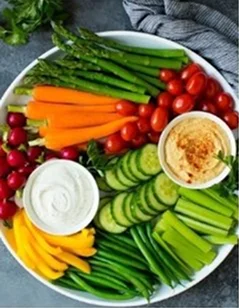Numerous individuals assume that aging or pulling at their eyes will inevitably result in vision loss. However, leading a sedentary lifestyle can also increase the likelihood of developing eye problems. By consuming a diet that is abundant in vitamins, nutrients, and minerals, one may prevent significant eye disorders.
Have you ever been told by your elders to eat carrots for better vision? But, is this advice really true? Yes, it is! Beta-carotene is a vital nutrient for eye health, which can be found in yellow foods such as sweet potatoes and butternut squash.
Apart from carrots, there are numerous other foods that can help maintain healthy eyes.
Also Read: The Worst Habits for Your Eyes
Top Foods for Good Eye Health:
Dietitians have ranked the top 10 foods that can assist in maintaining healthy eyes.
1. Sweet Potatoes
Vitamin A is essential for maintaining and enhancing the cornea's health. Additionally, it is a vital component of the pigment rhodopsin, which converts into electrical signals that enable the brain to perceive vision. Beta carotene, which is a type of provitamin A carotenoid, serves as an antioxidant. These carotenoids are inactive forms of the nutrient and are responsible for the deep orange or greenish hue of certain vegetables.
2. Eggs
While further research is needed, certain studies have suggested a potential correlation between blue light exposure and eye conditions such as macular degeneration.
Carotenoids are antioxidants that play various essential roles in maintaining overall bodily health, including improving vision. Two specific carotenoids, lutein and zeaxanthin, have been found to potentially aid in protecting the eyes from bright light.
Reducing exposure to blue light may lower the risk of developing macular degeneration, as per some researchers.
Eggs, particularly yolks, are a natural source of lutein and zeaxanthin. Recent research indicates that consuming eggs in moderation for 15 years can significantly decrease the likelihood of developing late-stage age-related retinopathy.
3. Dark Green, Cruciferous Veggies
Green leafy vegetables, particularly kale, collards, and spinach, are abundant sources of zeaxanthin and lutein, the same carotenoids found in eggs that support healthy eyesight.
Boost the nutritional value of your meals by incorporating greens. You can add them to your smoothies, serve them as a dipping sauce during supper, or even boil them with breakfast eggs for an eye-healthy meal.
4. Almonds
Vitamin E is a powerful antioxidant that protects all cells in the body, including those in the eyes. Exposure to pollutants, smoke, and harmful radiation can cause oxidative damage, leading to the degradation of eye cells and other cells involved in vision. However, vitamin E can help prevent such damage by eliminating free radicals.
Incorporating nutrient-rich foods such as almonds into your diet can benefit both your overall health and eye health. Consuming around 24 dry-roasted almonds, or 1 ounce, can provide 45% of your daily nutrient needs. Other fortified options include sunflower seeds, hazelnuts, various nut butters, and avocados.
5. Oily Fish
Experiencing dry and itchy eyes? Consuming oily fish such as salmon, trout, mackerel, and herring twice a week can help alleviate symptoms due to their high omega-3 fatty acid content. Dry eye syndrome is primarily caused by inadequate tear production and a lack of a tear film covering the eyes.
Although tears may seem to be composed entirely of water, they also contain mucus and oil. Therefore, a deficiency in essential fatty acids such as DHA and EPA may contribute to the development of dry eye symptoms. Research suggests that increasing the intake of these fatty acids can alleviate discomfort by enhancing tear production and providing anti-inflammatory benefits from omega-3 fatty acids.
6. Strawberries
Strawberries contain numerous essential nutrients that promote both overall health and eye health. Consuming just one bowl of strawberries provides the body with all the necessary vitamin C for the day.
Making a deliberate effort to maintain eye health is a wise decision. Additionally, studies indicate that specific groups can reduce their chances of developing cataracts by consuming vitamin C.
7. Black Currants
Black currants and other naturally red or purple foods (such as berries and purple potatoes) are rich in natural flavonoids known as anthocyanins.
Anthocyanins (specifically, ciliary muscles) have been shown to have a relaxing effect on the muscles in the eyes, making them a potential treatment option for glaucoma. Additionally, this vitamin may aid in reducing eye inflammation.
8. Saffron
Saffron, a versatile spice used in various cuisines worldwide, has been studied for its potential benefits for vision. According to research, consuming specific amounts of saffron may aid in improving eyesight and enhancing the retina's responsiveness, particularly in individuals with early macular degeneration.
9. Papaya
Papaya is a fruit that contains lycopene, a carotenoid that gives its pink-orange flesh, and may prevent cataracts. However, the real eye health hero in papaya is its high content of vitamin C, with one small fruit providing over 150% of the daily recommended intake. The eyes have a higher metabolic rate, which leads to faster free radical development, increasing the need for antioxidant protection from nutrients such as vitamin C in the cells of the eyes.
10. Beans
Are you aware that the health of your eyes can be influenced by dietary carbohydrates? According to the Age-Related Eye Disease Study, individuals who consumed diets high in glycaemic carbs had a significantly higher risk of developing vision loss from age-related macular degeneration.
To promote eye health, it is important to swap out high-glycemic carbohydrate sources such as refined grains, sugary drinks, and snack foods with options that are higher in fiber and lower on the glycemic index. One great option is beans, which are a good source of essential eye nutrients such as zinc and B vitamins, in addition to helping control blood sugar levels. Both dried and canned beans are available for convenient meal planning.
Also Read: Role of Diet and Nutrients in Maintaining Healthy Lungs
Final Thought
Good vision is essential for our daily activities, as it serves as a gateway to the outside world. However, we often take it for granted until we experience eye problems. To maintain good eye health, consuming nutrient-rich superfoods is highly recommended.
Related Blogs
- How Blue Light is Affecting Your Eyes, Your Sleep Schedule, and More
- 5 Signs of a Diabetic Emergency
- 11 Tips for Dealing with Anger
- 16 Best Sore Throat Remedies to Make You Feel Better Fast, According to Doctors
- 4 Reasons Scientists Say Exercise is Great for Rheumatoid Arthritis
- 5 Effective Ways to Boost Your Emotional Health
- 6 Crucial Tips to Follow for Better Sleep at Night




%20(1).jpg)

.webp)

%20(1).png)
.png)
%20(1).png)


%20(1).png)




%201.png)
